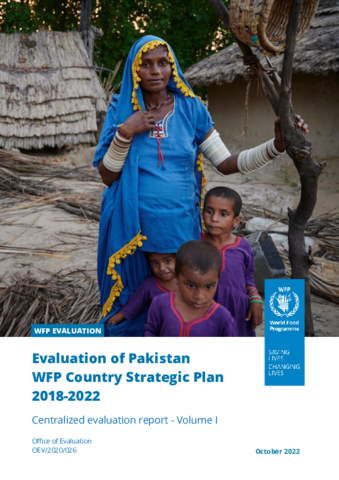
The evaluation was commissioned by the independent Office of Evaluation to provide evaluative evidence for accountability and learning to inform the design of the next WFP country strategic plan (CSP) in Pakistan. It covers WFP activities implemented between 2018 and 2021.
The evaluation assesses WFP’s strategic positioning and role and the extent to which WFP has made the strategic shifts expected by the CSP; WFP’s contributions to strategic outcomes; efficiency and factors that explain WFP performance.
It concludes that:
- Overall the CSP positioning was relevant to national policies and aligned with the UNSDF.
- WFP made progress in several areas, although unevenly across the SOs. Under SO1, unconditional food transfers contributed to stabilized and improved food security of TDPs. Under SO2 (social protection), several pilot efforts were developed, but WFP’s engagement remained largely operational. Under SO3, WFP supported the Government to move from short term emergency MAM treatment to multisectoral integrated programming which is positive given the aim to prevent stunting and address nutrition in a more holistic way. The treatment of acute malnutrition was effective. However, the coverage of MAM treatment and prevention of malnutrition programmes were below targets. Under SO4, multiple small-scale efforts were conducted to achieve resilient food systems, but these require upscaling for them to lead to wider results. Under SO5, the support provided in trainings and infrastructure hand over were relevant, but a comprehensive plan for strengthening capacity of national institutions was lacking.
- The CSP placed specific attention on supporting women and girls. However, this alone is not a demonstration of a gendered approach.
- Although the CSP signaled a shift towards a more strategic level support, WFP’s partnership with the Government has been more operational than strategic (adapting and improving system wide responses to known challenges).
- The process of decentralisation calls for more contextualised support in order to ensure that WFP activities meet local needs.



